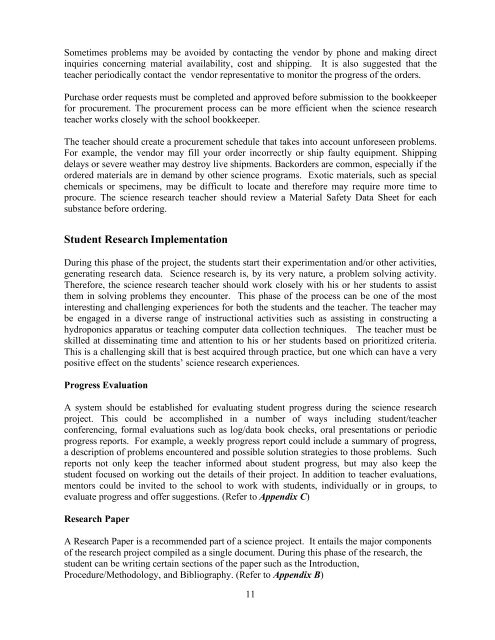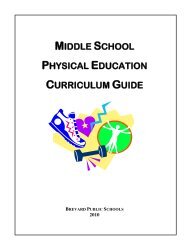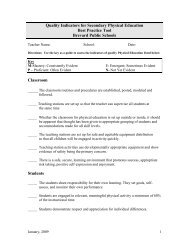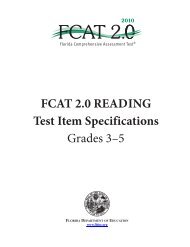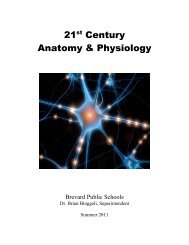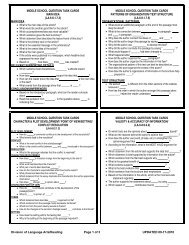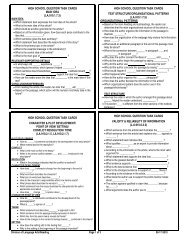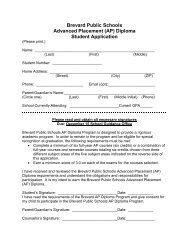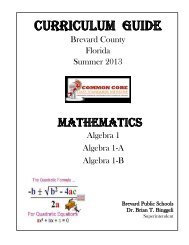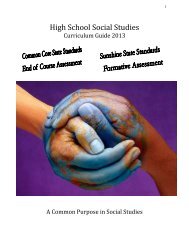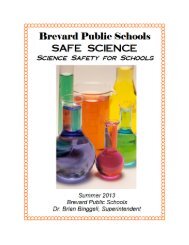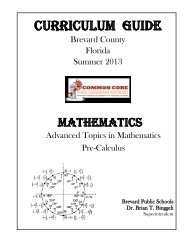Science Research Program Guide - Secondary Programs Home ...
Science Research Program Guide - Secondary Programs Home ...
Science Research Program Guide - Secondary Programs Home ...
Create successful ePaper yourself
Turn your PDF publications into a flip-book with our unique Google optimized e-Paper software.
Sometimes problems may be avoided by contacting the vendor by phone and making direct<br />
inquiries concerning material availability, cost and shipping. It is also suggested that the<br />
teacher periodically contact the vendor representative to monitor the progress of the orders.<br />
Purchase order requests must be completed and approved before submission to the bookkeeper<br />
for procurement. The procurement process can be more efficient when the science research<br />
teacher works closely with the school bookkeeper.<br />
The teacher should create a procurement schedule that takes into account unforeseen problems.<br />
For example, the vendor may fill your order incorrectly or ship faulty equipment. Shipping<br />
delays or severe weather may destroy live shipments. Backorders are common, especially if the<br />
ordered materials are in demand by other science programs. Exotic materials, such as special<br />
chemicals or specimens, may be difficult to locate and therefore may require more time to<br />
procure. The science research teacher should review a Material Safety Data Sheet for each<br />
substance before ordering.<br />
Student <strong>Research</strong> Implementation<br />
During this phase of the project, the students start their experimentation and/or other activities,<br />
generating research data. <strong>Science</strong> research is, by its very nature, a problem solving activity.<br />
Therefore, the science research teacher should work closely with his or her students to assist<br />
them in solving problems they encounter. This phase of the process can be one of the most<br />
interesting and challenging experiences for both the students and the teacher. The teacher may<br />
be engaged in a diverse range of instructional activities such as assisting in constructing a<br />
hydroponics apparatus or teaching computer data collection techniques. The teacher must be<br />
skilled at disseminating time and attention to his or her students based on prioritized criteria.<br />
This is a challenging skill that is best acquired through practice, but one which can have a very<br />
positive effect on the students’ science research experiences.<br />
Progress Evaluation<br />
A system should be established for evaluating student progress during the science research<br />
project. This could be accomplished in a number of ways including student/teacher<br />
conferencing, formal evaluations such as log/data book checks, oral presentations or periodic<br />
progress reports. For example, a weekly progress report could include a summary of progress,<br />
a description of problems encountered and possible solution strategies to those problems. Such<br />
reports not only keep the teacher informed about student progress, but may also keep the<br />
student focused on working out the details of their project. In addition to teacher evaluations,<br />
mentors could be invited to the school to work with students, individually or in groups, to<br />
evaluate progress and offer suggestions. (Refer to Appendix C)<br />
<strong>Research</strong> Paper<br />
A <strong>Research</strong> Paper is a recommended part of a science project. It entails the major components<br />
of the research project compiled as a single document. During this phase of the research, the<br />
student can be writing certain sections of the paper such as the Introduction,<br />
Procedure/Methodology, and Bibliography. (Refer to Appendix B)<br />
11


